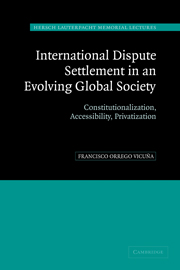 International Dispute Settlement in an Evolving Global Society
International Dispute Settlement in an Evolving Global Society Book contents
- Frontmatter
- Contents
- Preface
- Acknowledgements
- List of abbreviations
- Table of treaties
- Table of cases
- 1 An evolving international society: institutionalization, privatization, globalization
- 2 A constitutional court for an international society?
- 3 Individuals and settlement of international claims: change and adaptation of governing rules
- 4 Individuals before international courts and tribunals: a continuing progression
- 5 Shaping a new role for the individual in international dispute settlement: the contribution of specialized jurisdictions
- 6 The World Trade Organization integrated dispute settlement system: innovation and transition
- 7 An alternative dispute resolution system for international disputes
- 8 A centralized-decentralized dispute resolution system for the international community?
- Bibliography
- Index
4 - Individuals before international courts and tribunals: a continuing progression
Published online by Cambridge University Press: 04 August 2010
- Frontmatter
- Contents
- Preface
- Acknowledgements
- List of abbreviations
- Table of treaties
- Table of cases
- 1 An evolving international society: institutionalization, privatization, globalization
- 2 A constitutional court for an international society?
- 3 Individuals and settlement of international claims: change and adaptation of governing rules
- 4 Individuals before international courts and tribunals: a continuing progression
- 5 Shaping a new role for the individual in international dispute settlement: the contribution of specialized jurisdictions
- 6 The World Trade Organization integrated dispute settlement system: innovation and transition
- 7 An alternative dispute resolution system for international disputes
- 8 A centralized-decentralized dispute resolution system for the international community?
- Bibliography
- Index
Summary
In the early twentieth century, several remarkable treaties introduced the then novel concept of the direct access of individuals to some international courts and tribunals. This was at the time considered as an exception to the general rule of state exclusivity in international dispute settlement. However, when exception after exception is introduced it is at some point reasonable to ask whether it has not become itself the general rule. Obviously, the answer to this question is not yet positive, but the experience of the twentieth century has clearly established a direction, and it may well be that the evolution will be completed in the present century.
First steps
The first step was to allow an individual to appeal a national decision before an international tribunal. This amounted to a gigantic conceptual innovation in international law, even though restricted to a very specific ambit. This first step was that of the Hague Convention XII of 1907 establishing the International Prize Court, under the terms of which individuals could bring an appeal against the decisions of national prize courts affecting their rights and bring other actions. The effort failed, however, not only because the Convention was never ratified but also for the reason that the state could forbid its nationals from instituting proceedings, or could do so in lieu of the individual, which showed that the state still prevailed in the claim process.
- Type
- Chapter
- Information
- International Dispute Settlement in an Evolving Global SocietyConstitutionalization, Accessibility, Privatization, pp. 48 - 62Publisher: Cambridge University PressPrint publication year: 2004
